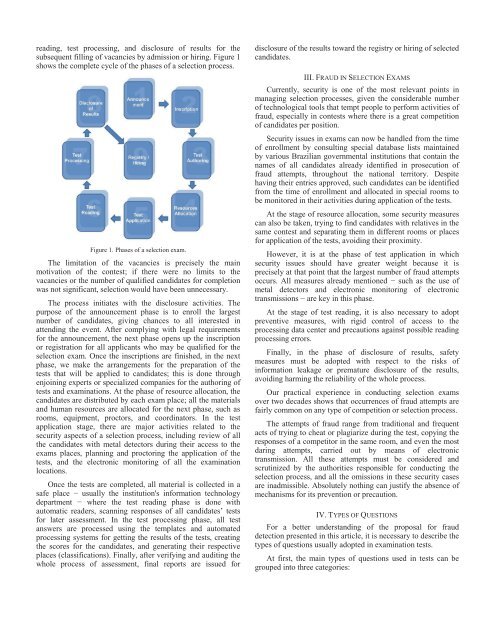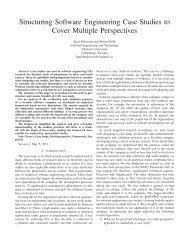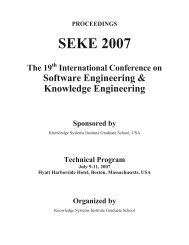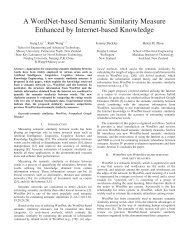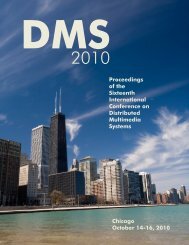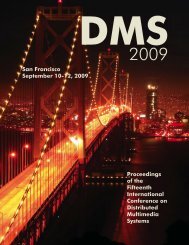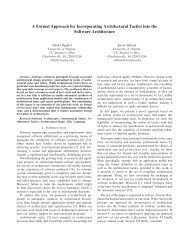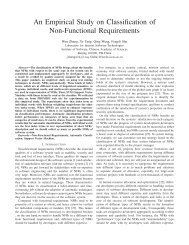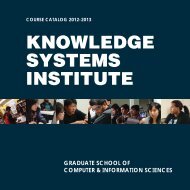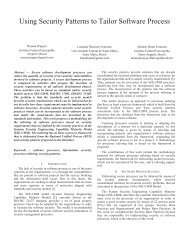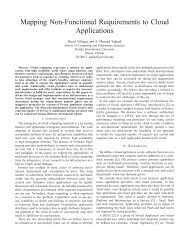Fraud Detection in Selection Exams Using Knowledge Engineering ...
Fraud Detection in Selection Exams Using Knowledge Engineering ...
Fraud Detection in Selection Exams Using Knowledge Engineering ...
You also want an ePaper? Increase the reach of your titles
YUMPU automatically turns print PDFs into web optimized ePapers that Google loves.
ead<strong>in</strong>g, test process<strong>in</strong>g, and disclosure of results for the<br />
subsequent fill<strong>in</strong>g of vacancies by admission or hir<strong>in</strong>g. Figure 1<br />
shows the complete cycle of the phases of a selection process.<br />
Figure 1. Phases of a selection exam.<br />
The limitation of the vacancies is precisely the ma<strong>in</strong><br />
motivation of the contest; if there were no limits to the<br />
vacancies or the number of qualified candidates for completion<br />
was not significant, selection would have been unnecessary.<br />
The process <strong>in</strong>itiates with the disclosure activities. The<br />
purpose of the announcement phase is to enroll the largest<br />
number of candidates, giv<strong>in</strong>g chances to all <strong>in</strong>terested <strong>in</strong><br />
attend<strong>in</strong>g the event. After comply<strong>in</strong>g with legal requirements<br />
for the announcement, the next phase opens up the <strong>in</strong>scription<br />
or registration for all applicants who may be qualified for the<br />
selection exam. Once the <strong>in</strong>scriptions are f<strong>in</strong>ished, <strong>in</strong> the next<br />
phase, we make the arrangements for the preparation of the<br />
tests that will be applied to candidates; this is done through<br />
enjo<strong>in</strong><strong>in</strong>g experts or specialized companies for the author<strong>in</strong>g of<br />
tests and exam<strong>in</strong>ations. At the phase of resource allocation, the<br />
candidates are distributed by each exam place; all the materials<br />
and human resources are allocated for the next phase, such as<br />
rooms, equipment, proctors, and coord<strong>in</strong>ators. In the test<br />
application stage, there are major activities related to the<br />
security aspects of a selection process, <strong>in</strong>clud<strong>in</strong>g review of all<br />
the candidates with metal detectors dur<strong>in</strong>g their access to the<br />
exams places, plann<strong>in</strong>g and proctor<strong>in</strong>g the application of the<br />
tests, and the electronic monitor<strong>in</strong>g of all the exam<strong>in</strong>ation<br />
locations.<br />
Once the tests are completed, all material is collected <strong>in</strong> a<br />
safe place − usually the <strong>in</strong>stitution's <strong>in</strong>formation technology<br />
department − where the test read<strong>in</strong>g phase is done with<br />
automatic readers, scann<strong>in</strong>g responses of all candidates’ tests<br />
for later assessment. In the test process<strong>in</strong>g phase, all test<br />
answers are processed us<strong>in</strong>g the templates and automated<br />
process<strong>in</strong>g systems for gett<strong>in</strong>g the results of the tests, creat<strong>in</strong>g<br />
the scores for the candidates, and generat<strong>in</strong>g their respective<br />
places (classifications). F<strong>in</strong>ally, after verify<strong>in</strong>g and audit<strong>in</strong>g the<br />
whole process of assessment, f<strong>in</strong>al reports are issued for<br />
disclosure of the results toward the registry or hir<strong>in</strong>g of selected<br />
candidates.<br />
III. FRAUD IN SELECTION EXAMS<br />
Currently, security is one of the most relevant po<strong>in</strong>ts <strong>in</strong><br />
manag<strong>in</strong>g selection processes, given the considerable number<br />
of technological tools that tempt people to perform activities of<br />
fraud, especially <strong>in</strong> contests where there is a great competition<br />
of candidates per position.<br />
Security issues <strong>in</strong> exams can now be handled from the time<br />
of enrollment by consult<strong>in</strong>g special database lists ma<strong>in</strong>ta<strong>in</strong>ed<br />
by various Brazilian governmental <strong>in</strong>stitutions that conta<strong>in</strong> the<br />
names of all candidates already identified <strong>in</strong> prosecution of<br />
fraud attempts, throughout the national territory. Despite<br />
hav<strong>in</strong>g their entries approved, such candidates can be identified<br />
from the time of enrollment and allocated <strong>in</strong> special rooms to<br />
be monitored <strong>in</strong> their activities dur<strong>in</strong>g application of the tests.<br />
At the stage of resource allocation, some security measures<br />
can also be taken, try<strong>in</strong>g to f<strong>in</strong>d candidates with relatives <strong>in</strong> the<br />
same contest and separat<strong>in</strong>g them <strong>in</strong> different rooms or places<br />
for application of the tests, avoid<strong>in</strong>g their proximity.<br />
However, it is at the phase of test application <strong>in</strong> which<br />
security issues should have greater weight because it is<br />
precisely at that po<strong>in</strong>t that the largest number of fraud attempts<br />
occurs. All measures already mentioned − such as the use of<br />
metal detectors and electronic monitor<strong>in</strong>g of electronic<br />
transmissions − are key <strong>in</strong> this phase.<br />
At the stage of test read<strong>in</strong>g, it is also necessary to adopt<br />
preventive measures, with rigid control of access to the<br />
process<strong>in</strong>g data center and precautions aga<strong>in</strong>st possible read<strong>in</strong>g<br />
process<strong>in</strong>g errors.<br />
F<strong>in</strong>ally, <strong>in</strong> the phase of disclosure of results, safety<br />
measures must be adopted with respect to the risks of<br />
<strong>in</strong>formation leakage or premature disclosure of the results,<br />
avoid<strong>in</strong>g harm<strong>in</strong>g the reliability of the whole process.<br />
Our practical experience <strong>in</strong> conduct<strong>in</strong>g selection exams<br />
over two decades shows that occurrences of fraud attempts are<br />
fairly common on any type of competition or selection process.<br />
The attempts of fraud range from traditional and frequent<br />
acts of try<strong>in</strong>g to cheat or plagiarize dur<strong>in</strong>g the test, copy<strong>in</strong>g the<br />
responses of a competitor <strong>in</strong> the same room, and even the most<br />
dar<strong>in</strong>g attempts, carried out by means of electronic<br />
transmission. All these attempts must be considered and<br />
scrut<strong>in</strong>ized by the authorities responsible for conduct<strong>in</strong>g the<br />
selection process, and all the omissions <strong>in</strong> these security cases<br />
are <strong>in</strong>admissible. Absolutely noth<strong>in</strong>g can justify the absence of<br />
mechanisms for its prevention or precaution.<br />
IV. TYPES OF QUESTIONS<br />
For a better understand<strong>in</strong>g of the proposal for fraud<br />
detection presented <strong>in</strong> this article, it is necessary to describe the<br />
types of questions usually adopted <strong>in</strong> exam<strong>in</strong>ation tests.<br />
At first, the ma<strong>in</strong> types of questions used <strong>in</strong> tests can be<br />
grouped <strong>in</strong>to three categories:


